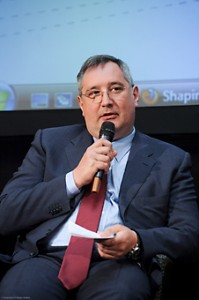Brace yourself. The cyberwar is coming.
Since last week, when the world learned about PRISM, a vast and secret American electronic surveillance program, Russian state officials have expressed renewed concerns about foreign social networks posing a national security threat. One day after news of the U.S. program broke, on June 7, 2013, Deputy Prime Minister Dmitry Rogozin told [ru] reporters that websites like Facebook and Twitter are elements of a larger American campaign against Russia:
Через них идет мощнейшая манипуляция общественным мнением, ведь всякие “лайки” и прочие кнопки, которые вы там нажимаете, моментально вводят вас в определенные группы, которые потом анализируются, систематизируются. […] Тем самым увеличивается количество тех людей, которые начинают получать специальную контентную информацию, подрывающую авторитет власти и ценности государства. […]
Through them [American social networks], there’s a powerful, ongoing manipulation of public opinion—indeed, every “like” and every click instantly lands you in a certain group, which is then analyzed and classified. […] In doing so, rising is the number of people, who start receiving special content that undermines the authority and value of the state. […]

Dmitry Rogozin, as Russian Ambassador to NATO and Special Envoy on missile defense, 29 June 2011, photo by Security & Defence Agenda, CC 2.0.
Just yesterday, June 11, in a letter [ru] to Rogozin and other security figures, Duma deputy Ilya Kostunov called for tighter regulations on state officials’ Internet activity, based on the worry that Russian bureaucrats commonly discuss or upload government secrets in communications hosted on American websites (namely, Google’s email service, Gmail). In an exchange [ru] on Twitter, Kostunov discussed the possible implementation of his proposed regulations, running into some disagreement about the need for additional legislation and the proper criminal classification of uploading secret materials to a foreign Web host.
Communications expert Petr Pervushkin argued [ru] that a closed virtual network for private communications has already existed in the Russian government for seven years, though another Twitter user put that figure [ru] closer to four years. Just Russia party functionary Aleksandr Luchin noted that rules are already in place to forbid discussing state secrets on Internet sites like Google and Facebook, but acknowledged [ru] that regulations fail to set penalties. Luchin proposed tying such infractions to the criminal codes against disclosing state secrets (though he didn't specify [ru] if he had in mind Article 283 or 284, which threaten maximum imprisonment up to four and three years, respectively), whereas Kostunov has advocated equating such behavior with treason (article 275), which carries a prison sentence up to twenty years. (This push for classifying the offense under treason prompted qz.com reporter Leo Mirani to declare, perhaps hyperbolically, that Russia is “stepping up its war on social networks.”)
Meanwhile, blogger and RuNet guru Anton Nosik claims [ru] that station management refused to air his recent appearance on OTR, Russia’s all-new public broadcasting television channel, when during the recording he criticized Rogozin’s comments about the supposed American cyberwar against Russia. Nosik took part in an episode of the show “The Social Network,” answering a series of RuNet-related questions that began with one about Rogozin's remarks. After four days of silence following his visit to the studio, Nosik took to LiveJournal for a second time to discuss [ru] the curious absence from OTR's official website [ru] of his appearance:
Как я и предполагал, моё интервью […] не попал ни в их загадочный эфир, ни даже на сайт. Потому что, как выясняется, для этого супернезависимого телеканала неприкасаемыми фигурами являются не только Путин и Собянин, но и вице-премьер Рогозин. Самое время Общественному телевидению открывать программы про кошечек, собачек и кулинарию.
As I expected, my interview […] has appeared nowhere in [the station’s] mysterious feed, or even on the website. Because, it turns out, for this super-independent TV channel, the untouchable figures aren’t limited to Putin and Sobyanin, but even include Deputy Prime Minister Rogozin. OTR might as well launch shows about kitties, doggies, and cooking.
Nosik doesn’t often respond to the hundreds of reader comments that follow his blog posts, but one audience member did provoke a reaction, when he accused [ru] Nosik of adopting an approach “inappropriate to television,” arguing that he attacked Rogozin too early in the broadcast, without “nuance” or first establishing the context of his criticism. Nosik wrote back [ru] to say that he’s never encountered such problems in the hundreds of interviews he’s granted to other TV channels over the past twenty years.
While it’s true that OTR has yet to air or even post to its website Nosik’s segment, his thirteen-minute interview is accessible on OTR’s official YouTube channel (see above). The station’s troubles with Nosik come the same week as another censorship scandal [ru] surrounding a different unaired episode of “The Social Network,” wherein hosts Vladislav Sorokin and Ekaterina Voronina poked fun at Vladimir Putin’s recent divorce, sharing mashable.com’s faux dating profile for Russia’s now-single head-of-state. When the station declined to telecast the episode “for technical reasons” [ru], Sorokin and Voronina announced on Facebook [ru] that they would resign from the show at the end of the month.








4 comments